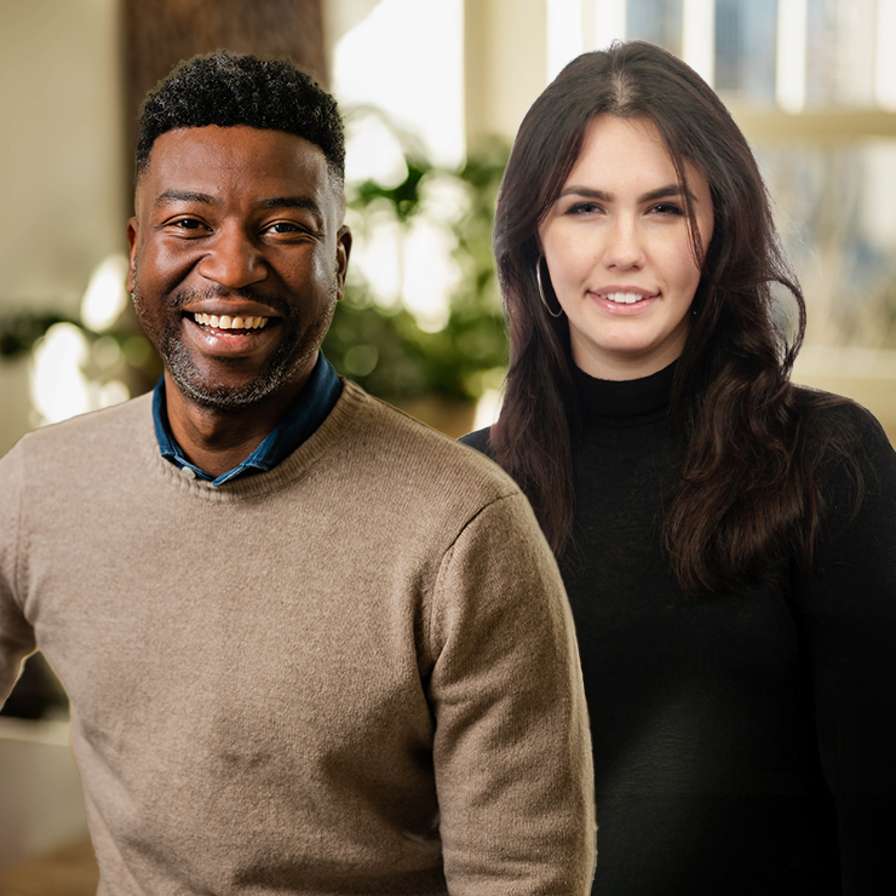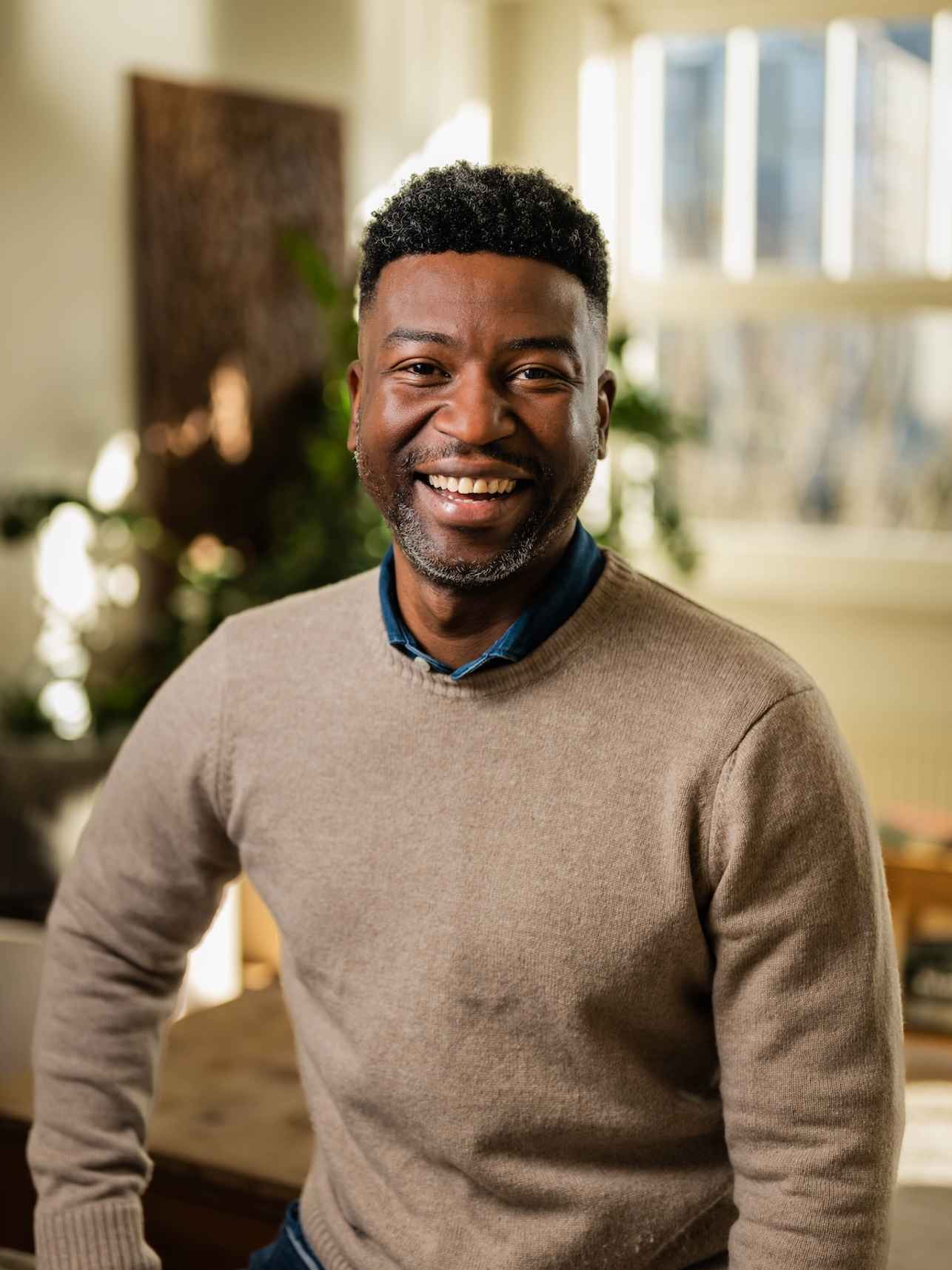Master Global Sustainable Business Management
master's, full-time, 1.5 years
AI as a Catalyst for Sustainable Change
MGSBM Project

Muheti and Mariia won the essay competition and were invited to the Swedish Chamber’s Sustainability & Innovation Summit AI event, Driving the Sustainable Transition.
When GSBM lecturer Mike Russell introduced his class to an essay competition organized by the Swedish Chamber of Commerce, it immediately caught the attention of Mariia Babii and Muheti Mbazima, who were eager to participate. Their enthusiasm paid off—they won the competition and were invited to the Swedish Chamber’s Sustainability & Innovation Summit AI event, Driving the Sustainable Transition. Excited by the opportunity, both Mariia and Muheti were keen to share their experiences and thoughts on how AI can drive sustainable change.
Both students are currently enrolled in the Global Sustainable Masters program. Mariia began her academic journey studying International Business, majoring in Organizational Change. This background shaped her passion for understanding how businesses can create real impact. Her work experience in HR further deepened her interest in the role of technology in tackling sustainability challenges. Muheti, an impact entrepreneur and founder of a consultancy startup, has worked in both the private and public sectors. His experiences motivated him to expand his knowledge in sustainability and pursue a masters.
AI as a Catalyst for Sustainable Change
Both Mariia and Muheti see AI as a powerful tool for driving sustainability. "The fact that AI can simulate human thinking and predict different scenarios based on data from multiple sources makes it a powerful tool for progress," said Muheti, who strongly believes in leveraging AI to advance the Sustainable Development Goals.
Mariia emphasized AI’s role in fostering inclusivity: “AI can make education more accessible, help people find jobs that match their skills, and even improve healthcare outcomes. But at the same time, it comes with challenges—such as energy consumption, data privacy, and ethical concerns. What really interests me is figuring out how we can use AI in a way that maximizes the benefits while minimizing the risks. It’s not just about making systems smarter—it’s about ensuring they work for everyone.”

Winning Essays: Exploring AI’s Impact
During the competition, both students examined different applications of AI. Muheti focused on financial systems, exploring how AI can modernize outdated financial policies that no longer align with sustainability goals. "I proposed using AI to analyze macroeconomic policies and their connections at both local and global levels. I also explored how AI can contribute to a more sustainable financial system, aligned with the Doughnut framework created by Kate Raworth," he explained.

Mariia, on the other hand, envisioned what an AI-powered sustainable world could look like by 2030."I focused on how AI can drive both environmental and social sustainability—predicting natural disasters, optimizing energy use, improving food security, and making education more accessible. But I also highlighted the importance of ethics and regulation. AI should be a tool that benefits everyone, not just big corporations or developed countries."
Insights from the Summit
As winners, Mariia and Muheti were invited to participate in the summit organized by the Swedish Chamber of Commerce. "It was inspiring to be in the same room with major businesses, local governments, and city officials from Sweden, all discussing how AI can support sustainability efforts," said Muheti.
Mariia found the discussions on ethical AI particularly intriguing. "It was fascinating to see real-world applications of AI—how it’s being used to make cities more sustainable, improve supply chains, and support regenerative agriculture. It made me even more excited about the possibilities AI offers," she added.
Looking Ahead: AI’s Future in Sustainability
After attending the event, Muheti concluded that one thing was certain: “AI is here to stay.” He emphasized the importance of integrating AI across sectors: "If we don’t embrace AI, we risk falling behind in development. It should be seen as a collaborative tool, not a competitor. By leveraging AI, humans can focus more on strategic thinking and problem-solving instead of routine administrative tasks that don’t add real value to society and the planet."
Mariia also underscored the significance of innovation at all levels. “Sustainable change isn’t limited to large corporations—it starts with local, community-driven initiatives like renewable energy integration and circular economy practices, which can serve as global models for sustainable urban development. Startups bring innovation, while corporations provide resources and scale. Collaboration between the two is essential for meaningful impact.” However, she also highlighted key ethical considerations: “AI’s high energy consumption and resource demands need to be addressed through better efficiency strategies. Additionally, concerns around data privacy, algorithmic bias, and equitable access require thoughtful regulation.”
Overall, both Mariia and Muheti left the summit with a reinforced belief in AI’s potential. "AI isn’t just a tool for efficiency—it has the potential, if used correctly, to genuinely make the world a better place," Mariia concluded.